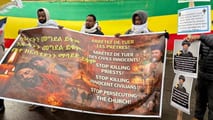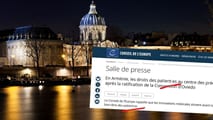

Jan Figel goes to the ECtHR on restrictions on religious freedom during Covid
COVID: Jan Figel goes to the ECtHR
Interview with Ján Figeľ, a European Commissioner from 2004 to 2009, then as Slovak minister of Transports from 2010 to 2012. From 2016 to 2019 he was European Commission special envoy for the promotion of freedom of religion outside the EU
- What were the restrictions on religious freedom in Slovakia in 2020?
In the first wave of pandemics the blanket ban was issued by the Public Health Office. De facto, churches whether large cathedrals or small chapels have been closed together with other centers for collective entertainment, culture or sport. When this blanket ban on public collective worship was repeated in early 2021 again, I was convinced that this violates Slovak Constitution and the international law valid in my homeland. I turned to the Government and to Prosecutor General requesting respect and protection of fundamental freedoms and human rights. There were no responses.
In that time mortality rate per capita in Slovakia caused by pandemics was the highest in the world! Measures were not based on science, they were counterproductive, causing a lot of human losses. In February 2021 I decided to submit a complaint to Strasbourg. It was updated in April 2021. Catholic, Protestant and Orthodox bishops supported my initiative, as their justified demands were not accepted by the Government. Court registered this submission and, in the end of 2022, published the information on its official web-site.
- The communication published by the ECHR is very brief, could you elaborate for us the claims of your applications?
My complaint registration and official publication of the ongoing proceedings by the ECHR are important. This means process of adjudication is going on, and final Court decision is expected. Slovak Government sent its arguments to the Court, several qualified organizations asked and received positions of the third parties. One of them is the ECLJ. I welcome this highly professional interest and support. On my side together with lawyers I finalize the response on arguments from the Government of Slovakia. After July everything is fully delivered to the Court for a qualified decision.
The complaint presents arguments on violation of three crucial conditions for admissible limitation of religious freedom according the European Convention: missing legal base for such provisions, questionable legitimacy of pursued objective without any scientific data, and disproportionality of adopted measures. They were far from necessity in democratic society.
- Were you surprised at the time by the easiness or the disregard with which all the EU governments restricted religious ceremonies, etc.? How do you explain it?
This easiness was striking in some countries, but it was not shared by all. For example, blanket ban of worship in Slovakia was the most restrictive and the longest in use in the region, if we compare with Czechia, Austria, Hungary, Ukraine and Poland. It speaks about a weak respect to fundamental human rights, relativization of mental and spiritual health of people in time of crisis. Instead of secularity, secularism is on rise, and religious freedom is often a victim - it uses to be misunderstood, abandoned, and abused. For me it was unacceptable to see closed churches in time of Covid crisis when shopping malls were full of customers.
- So far, the ECHR has been overly cautious on cases related to Covid. How optimistic are you about your case? Do you think that the ECHR will dare to condemn a State for excessive measures taken against covid?
Restrictions of religious freedom are possible and acceptable. But state limitations must be in line with legality, legitimacy and proportionality criteria. European Convention on Human Rights in Art. 9 allows for only such limitations as are prescribed by law and are necessary in a democratic society in the interest of inter alia public health.
In the first wave of pandemics Court did not accept any complaint against limitations. But it shows more openness for later cases, where more knowledge and data were collected. And therefore, scientific differentiation and more effective measures were expected. My complaint reacted on 2nd wave measures in Slovakia. When other authorities like church representatives, constitutional lawyers, public authorities were mostly silent or complacent, I decided to raise my voice and to react. I wrote letters to all members of Government, President, Speaker of the Parliament and General Prosecutor. No responses, no corrections, regrettably. Therefore, I decided to claim my fundamental right protection in Strasbourg. As a former Special Envoy for FoRB outside EU I had a lot of experience on this agenda. As a European I believe that we cannot be credible in promoting FoRB outside of the Union if we do not care or respect FoRB for all inside of the Union.
- Now that covid is pretty much behind us, what can we learn from this regarding the protection of religious freedom?
Expected decision of the Court will be a precedent. This will be binding for Slovakia, but will serve as important jurisprudence for the whole European continent. In time of crisis, we should never put religious freedom against public health through ban on communal worship. This is undemocratic and illiberal.
Old Roman law principle says: Vigilantibus iura scripta sunt! For true justice in society, we must stay vigilant! Even more so when we understand that FoRB is a litmus test of all fundamental human rights! There is a deep nexus between FoRB and human dignity.













